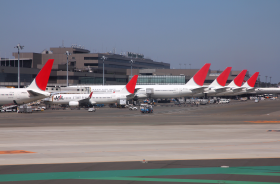
ACI World, IATA and WWACG agree on new industry-wide governance
Montreal – Airports Council International (ACI) World, the International Air Transport Association (IATA), and the Worldwide Airport Coordinators Group (WWACG) announced the agreement of a new governance structure for the WSG that puts the interests of the traveling public at the center of the process. Airport operators, airlines, and slot coordinators will now play an equal role in determining the global guidelines for the allocation of airport slots.
More than 200 airports require slot coordination because they have insufficient capacity to meet demand at all times of the day. Coordination based on global standards helps to maximize utilization of existing capacity, avoid delays and improve the passenger experience.
The new industry-wide governance was signed today in Seoul, South Korea by ACI World Director General Angela Gittens, IATA Director General and CEO, Alexandre de Juniac, and WWACG Chairman, Mr. Eric Herbane. All parties agreed that new governance and increased collaboration provides an opportunity to further modernize slot allocation mechanisms to the benefit of the travelling public and the aviation community at large.
“This new agreement on airport slots will have a transformative effect on a crucial component of the air transport industry and is a result of close collaboration between ACI and its global partners, IATA and the WWACG,” ACI World Director General Angela Gittens said.
“ACI and IATA forecasts show that global traffic will double by the 2030s. This highlights the need for airports and airlines to make best use of existing infrastructure as well as plan for new infrastructure. This fully reformed governance sets the ideal ground to regularly review the slot allocation process with the appropriate level of ambition and in line with an increasingly competitive and highly connected global network.”
IATA Director General and CEO Alexandre de Juniac said the new guidelines would make slot allocation even more responsive to changing needs of the market.
“For more than 40 years, the Worldwide Slots Guidelines has managed scarce airport capacity fairly, transparently and independently,” Mr de Juniac said. “This has enabled airlines to make network investments with certainty. But more importantly it has benefitted consumers by ensuring schedule reliability while enhancing competition by providing opportunities for new entrants in even the most congested airports.
“By working together with ACI and WWACG the time-tested WSG will become even more responsive to evolving market needs. But it is vital that policy-makers remember insufficient capacity to meet demand forfeits economic opportunities. The new WSG governance will make the best use of what we have—but it is no substitute for investing in modern airports and air traffic management.”
Worldwide Airport Coordinators Group (WWACG) Chairman Eric Herbane also welcomed the announcement.
“In the context of Air Transport liberalization for a growing number of regions around the world which results in an ever increasing number of congested airports, it is of the utmost importance that scarce airport capacity available is allocated in a fair, transparent and non-discriminatory way by airport coordinators or schedules facilitators acting independently from any interested party to guarantee the benefits of the liberalization,” Mr. Herbane said. “Our international airport coordinators and facilitators association welcomes this new WSG governance that now brings together, as equal partners, the three main Industry stakeholders representing capacity providers and capacity users of an airport, together with those in charge of the capacity allocation, with the same goal to ensure the Industry airport slot allocation best practices meet the needs of the passengers. We trust that in the future, should regulators around the world ever still feel necessary to act in slot allocation, they will understand the global nature of this industry by taking their inspiration in the WSG for the backbone of their regulation, relying on such broad and various experiences brought together with this new WSG governance.”
For more information, please contact:
Corporate Communications
Tel: +41 22 770 2967
Email: corpcomms@iata.org
Sabrina Guerrieri
Manager, Communications
ACI World
Telephone: +1 514 373 1200
Email: mediarelations@aci.aero
Eric Herbane
Chairman, WorldWide Airport Coordinators Group
Email: chairman@wwacg.org
Notes for Editors:
- Airport slots are specific points in time allotted for an aircraft to land or take off at an airport. Where the demand for slots at a particular airport exceeds the available supply, the airport can be considered ‘capacity-constrained’, at which time, a ‘slot allocation’ process is implemented. See this video for a brief guide to airport slot allocation.
- Airports Council International (ACI), the trade association of the world’s airports, was founded in 1991 with the objective of fostering cooperation among its member airports and other partners in world aviation, including the International Civil Aviation Organization, the International Air Transport Association and the Civil Air Navigation Services Organization. In representing the best interests of airports during key phases of policy development, ACI makes a significant contribution toward ensuring a global air transport system that is safe, secure, efficient and environmentally sustainable. As of January 2019, ACI serves 646 members, operating 1,960 airports in 176 countries.
- IATA (International Air Transport Association) represents some 290 airlines comprising 82% of global air traffic. You can follow IATA at https://twitter.com/iata for announcements, policy positions, and other useful industry information..
- The Worldwide Airport Coordinators Group (WWACG) the trade association of officially appointed airport coordinators and schedules facilitators around the world that play a key role in air transport activities by assuring that aircraft operators flight intentions and, among them, airlines schedules meet the capacity requirements at the busiest airports worldwide and that the planning of the traffic on these airports is not generating built-in delays.
